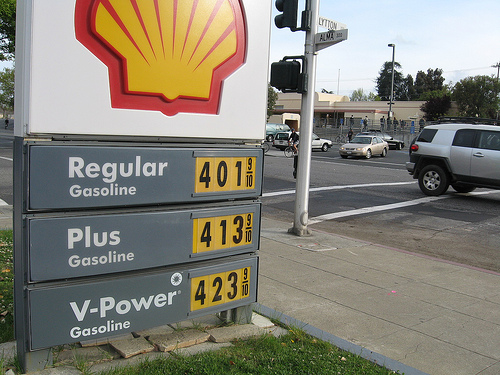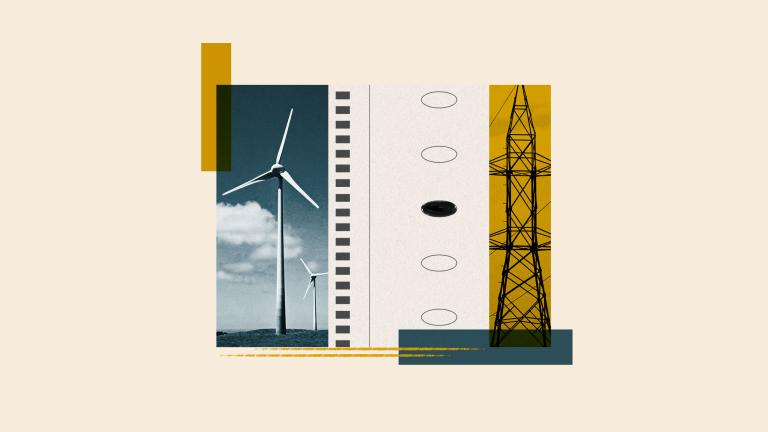So I’m reading in Politico about Democratic fecklessness. (Yes, half my posts begin this way.) The problem is, whenever gas prices go up, Republicans benefit. They have a simple, powerful message ready to go, right off the shelf: drill here, drill now, pay less. Not enough drilling: that’s why gas prices are high. Drilling more: that’s how to lower them.
If a Republican is president, congressional Democrats and hippie enviro groups are blocking new drilling. If a Democrat is president, he and his cronies in Congress are pandering to liberals by blocking new drilling. It’s the same every time, so it’s all but inevitable that as gas prices rise they’re trying to tag Obama the “pay more at the pump” president.
In response, Democrats … flail. Every time. They say “we can’t drill our way out,” but they pretend like we can get out by punishing commodity speculators, opening the strategic reserve, or implementing “use it or lose it” gimmicks. They accept the fundamental falsehood at the root of the conservative position — the way to lower gas prices is increase supply of U.S. oil — and then reject the most obvious implication of that premise, i.e., we should drill more.
The result is hesitant, incoherent, poll-driven mishmash. In other words, vintage Democratic messaging.
Into this fog last week came a beam of light in the form of an extraordinary speech from Sen. Jeff Bingaman (D-N.M.), which didn’t get the attention it deserved. Bingaman is not normally a talky guy. He’s not a McCain or Lieberman, on Sunday talk shows so often they keep toothbrushes in the green room bathrooms. Nor is he given to grand political gestures. He’s cautious by temperament (to a fault, I’d argue). Despite his reticence, though, he is among the very few senators who understands energy policy in any depth.
Apparently, he finally had enough of the overheated, unmoored ideological fantasies that pass for public discussion of gas prices. So he dropped some knowledge.
First, he explained that the price of gas follows the price of oil. Then he explained that the price of oil is set on the global market. It is largely unaffected by domestic policies like EPA carbon restrictions and Gulf oil permitting. It is only barely affected, and only at the margins, by U.S. supply, which flows from just 2 percent of the world’s reserves. (After all, U.S. production has been rising even as oil prices rise too.) The price of oil is shaped by supply constraints in petrostates, demand growth in developing countries, OPEC policy, and unrest in the Middle East. None of those, you’ll note, take place in America.
What follows is an inescapable conclusion (my emphasis):
But what can Congress do to help ease the burden of high prices for U.S. consumers, when oil prices are determined mostly outside our borders? I think a realistic, responsible answer has to be focused on becoming less vulnerable to oil price changes over the medium- and long-term. And we become less vulnerable by using less oil.
That’s it. That’s the crux of the matter. If we want to solve our problems with oil, we have to use less of it. That simple truth is what centrist Democrats generally refuse to tell their constituents.
Why? Because Democrats are always running scared. They’ve been scared off of the demand-side message by pollsters who tell them voters don’t like conservation, and by conservative concern trolls who invoke Carter, and by Beltway media CW drones who tell them that the message will lose the morning.
But in the end, you cannot out bullsh*t a bullsh*tter. Dems are never going to win a war of id-driven manipulation against the Frank Luntzes of the world. The Luntzes and the Gingriches will always be more shameless. They’ll always go farther, lie bigger, pander more. Voters may not like extremists (and they sure hate congressional Republicans), but no one, not even much-heralded (if largely mythical) independents, likes prevaricating poll-watchers. At least Republicans mean what they say!
The only thing Dems have going for them is that the demand-side message is correct. The truth is on their side. Domestic oil drilling will create some jobs and pump temporary economic stimulus into certain areas (as any heavily subsidized industry would), but it will not meaningfully affect global oil prices or the price of gasoline. The only way to be safer from oil shocks is to use less oil.
Rather than the Republican Lite message they’re using now, centrist Dems should follow Bingaman’s lead and tell the truth, calmly, without hype or partisan rancor, but firmly. The American people might even appreciate being treated like adults.


